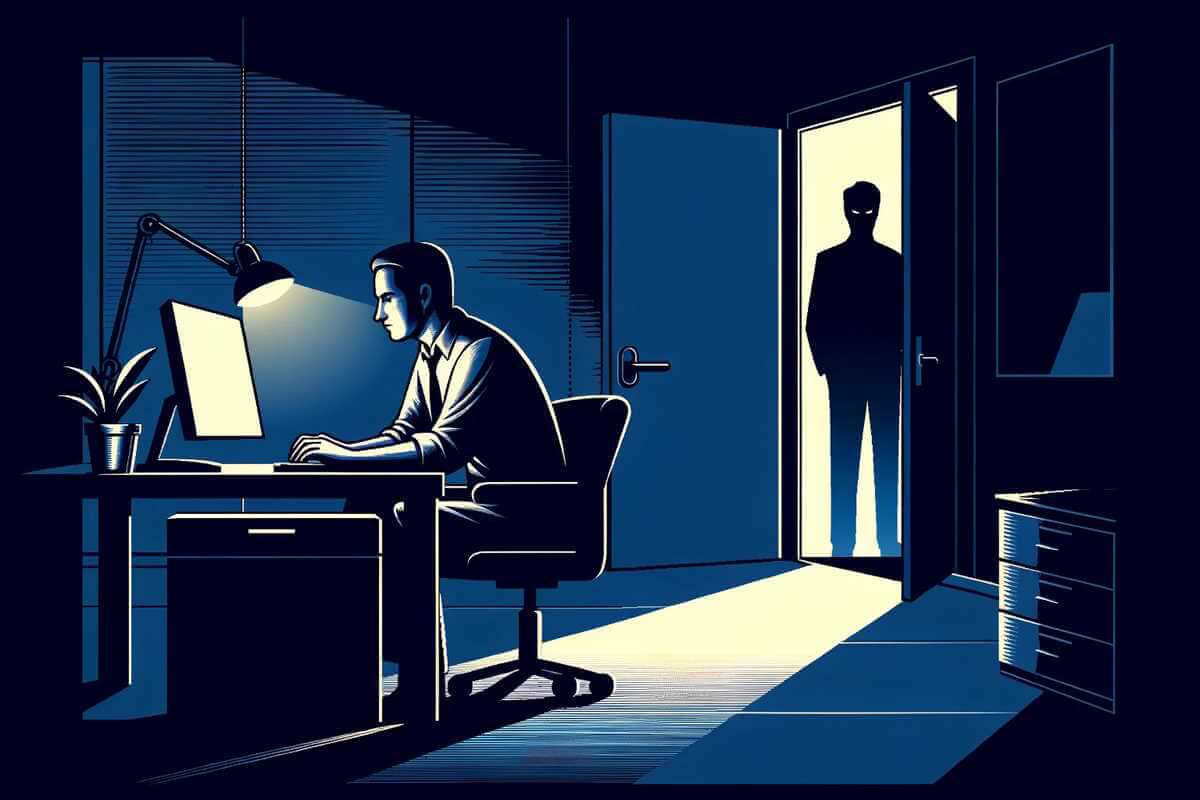The seduction of overtime: finding balance in work and life.

Picture this: It's past midnight, long after the sun has set, and there you are, tapping away at your keyboard, embodying the zeal of an overly caffeinated coder in a movie montage. The thrill of finding yourself in “the zone”, that state of deep focus where complex work feels effortless, or the allure of being the last one standing on Slack can be oddly exhilarating. Let's face it, sometimes working late feels like you're the hero of the day, cape billowing as you triumph over the forces of deadlines and project challenges. It's fun, it's rewarding, and let's not forget the potential for that sweet, sweet recognition from your boss and peers.
But here's the kicker - while basking in the sleep destroying glow of your computer screen in these solitary after-hours might give you a rush, it's a slippery slope that can lead to unrealistic expectations, chronic stress, and make you ripe for burnout. Let's take a look at the double-edged sword of overtime - unravelling how it can be both a thrilling ride and a potential trap, and most importantly, how you can master the art of balance for a sustainable and fulfilling career (and life!) through mindful actions.
The late night scream that made me pause
There I was, in “the zone” - that sweet spot of intense focus where everything else fades away - completely absorbed in building out a new prototype. My fingers danced over the keyboard, walls of code bursting out of my brain onto my screen in an otherwise silent office. I was in my element, caught up in a world where time seemed to soften. Hours had passed, well beyond the end of a typical working day, but the thrill of creation had me hooked. I didn't even notice when the building lights automatically shut off, enveloping me in an unexpected darkness.
Engrossed in my coding world, the faint sound of a door creaking open barely registered in my mind. It was a distant, irrelevant noise until a sudden, piercing scream cut through the silence. Startled, I spun around to see a cleaner, who had been as unaware of me being there as I had been of the passing hours. She clutched her chest, gulping in air, taken aback by the unexpected sight of someone lurking in the late night shadows. We shared a nervous laugh and she went back to work. In that short, shared moment of surprise, the absurdity of the situation dawned on me. The incident, though brief, was like a cold splash of water on my face. It prompted me to pause and reflect - when had staying late become more of a rule than an exception in my work life?
That scream in the dark served as a wake-up call, revealing a pattern I hadn't consciously recognised. The rush of solving problems and the desire to impress had slowly nudged me into a routine of endless late nights. The prototype I had been labouring over that night turned out to be a major success, earning me a wave of praise and recognition from my peers and superiors. The rush of endorphins was undeniable. Yet, this success came at a cost. It set a precedent. What began as a pursuit driven by passion and a desire to excel gradually transformed. It was no longer just about the joy of overcoming challenges; it became a race to meet and exceed the lofty standards I had inadvertently established for myself.
The irony wasn't lost on me. There I was, earning praise for my dedication and hard work, while simultaneously painting myself into a corner. Each successful project that came out of these marathon sessions only reinforced the cycle. What started as a voluntary dive into overtime began morphing into an expectation, both from myself and others. The boundaries between work and personal life blurred, and the notion of a 'normal' working day faded into oblivion.
The hidden cost of “just a few more hours”
Imagine this: a never-ending loop where late nights at work start feeling less like a spontaneous choice and more like a necessity. This isn't just about missing a few dinners or episodes of Bluey; it's about how the relentless pursuit of “just finishing up” can quietly erode our mental well-being, seep into our physical health, and subtly shift the ground rules at work. After I found myself caught in this snowballing cycle of overtime, I began to notice the toll it took - not just on me, but also on the team culture around me. It's like a ripple effect; what starts as a personal pattern soon becomes a communal norm, a standard that everyone feels pressured to live up to. The consequences? A worsening state of mental health, physical symptoms that can't be ignored, and a work ethic that, while glorified, is anything but healthy.
The mental toll of this ongoing overtime began to manifest in subtle yet increasingly noticeable ways. Sleep became elusive; each night, I'd toss and turn, my mind blaring re-runs of the day's work or building up worry about the tasks that awaited me in the morning. It felt like I was never truly recharging, just barely scraping by on the bare minimum of rest. Even the smallest setbacks or interruptions started to trigger disproportionate frustration and anger. The activities and social gatherings I once enjoyed lost their appeal, leaving me feeling disconnected and disinterested, even when I was surrounded by friends outside of work. The constant state of mental fatigue and irritability was a clear sign that the extended hours were not just a physical drain but an emotional one, eating into the very essence of my well-being.
A bold move that was sure to fail
Realising the severity of my situation, I knew drastic measures were necessary to reclaim my life. I decided to go “cold turkey” on overtime. I set a non-negotiable end to my workday - 5:30pm sharp, no exceptions. As the clock struck half-past five, I would lock my computer, leave the office, and disconnect entirely from work. This also meant blocking those endorphin fuelling work chat apps on my phone once I left for the day. At first, sticking to this new routine felt burdensome, I felt like I was simply slacking off and “letting the team down”. But this hard stop was crucial. It forced me to prioritise and manage my workload more efficiently during regular hours. Reclaiming my evenings allowed me to find joy in my hobbies I had neglected and spend some quality time with my slobbery dog, bringing a sense of fun and relief back into my days. This simple, yet disciplined approach was a significant first step in restoring balance to my life and breaking the cycle of perpetual overtime.
Despite my commitment to this new routine, I couldn't shake off the nagging fear of being called out as a slacker. Each day, as I would lock up at 5:30pm, I braced myself for the critical judgement that never came. Instead, something unexpected happened - others started noticing a change in me - a return to my old, more upbeat self. “It's nice to have the old you back”, they'd comment, or “You seem happier.” These remarks were not just casual observations, they were affirmations that I had made the right decision. I wasn't just reclaiming my time; I was reclaiming my joy and well-being. The best bit? It was contagious. Gradually, I noticed a shift in the team's atmosphere. The perpetual “hard work” fog seemed to lift, and work became a more vibrant, enjoyable place. People were more engaged, conversations were lighter, and there was an overall sense of well-being that I hadn't noticed was missing before. In this newfound environment, the once ever present pressure to overperform had given way to a healthier, more sustainable work pace. My decision to step back from the overtime brink had, in a way, acted as a catalyst for a healthier, more balanced team dynamic.
Sunshine and rainbows
As I settled into this new world order, I noticed a significant shift in my approach to work. Problems that once seemed impossible to complete within regular hours began to unravel more easily. Tasks that previously would have had me burning the midnight oil were now being wrapped up during my standard workday. This wasn't just about managing my time better; it was that old adage come to fruition - working smarter, not harder.
Being happier, better rested, and free from the guilt that used to cloud my time outside of work, I found a newfound appreciation for life beyond the office walls. I felt less burdened with the worries of work and began allowing myself to enjoy my personal time fully, without the lingering sense of “not having done enough”.
But let's be real - positive change isn't always a nice upward trend. There are days when I still find myself sliding back into old habits, whether it's compulsively checking Slack messages or getting too engrossed in a challenging project. The difference now is that I tend to recognise these patterns more quickly. Each time I notice myself slipping, I try to throw the turkey back in the freezer and focus on reclaiming some balance.
A lesson worth sharing
This journey has taught me something I'd like a lot more people to pay attention to: that it's possible to be productive and successful without sacrificing our well-being. Yes, it takes a reflective moment, a spoonful of discipline and a conscious effort to maintain this balance, but the rewards - both professionally and personally - are undeniable.
In the fast-paced world of tech, it's a story I've seen and heard echoed by many colleagues and peers. The lure of “just finishing up” or the thrill of solving one last problem before calling it a day often leads us down a familiar path of late nights and extended hours. As common as this narrative is in our industry, along with the emotional and physical tolls that accompany it, there aren't really any silver bullets to “fix” the problem, but there is a crucial step we all can - and should - take to navigate these challenges. Actively taking a moment to regularly reflect on your work habits, to see if you've inadvertently entered this overtime cycle, is vital. It's an opportunity to reassess and realign your approach to work. It's about finding a strategy that respects your professional ambitions while also honouring your personal well-being and the things in life that bring you joy outside of work.
If you find yourself caught in the cycle of endless overtime, remember, stepping back isn't a sign of weakness; it's a courageous act of self-preservation and a strategic pathway to sustainable success. And your slobbery dog (or goldfish) will love you for it.
